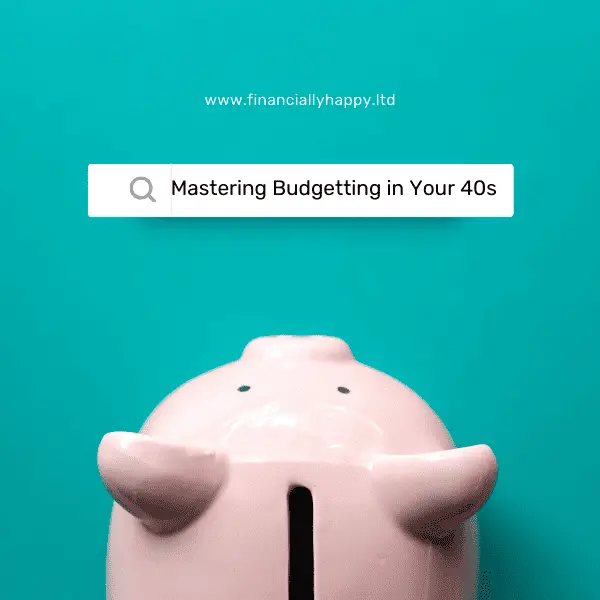From Struggle to Success: The Importance of Budgeting in Achieving Financial Independence
As a financial coach, I often hear people say they struggle to achieve financial stability, never mind independence, despite working hard and earning a decent income.
The problem is not always that they don’t earn enough but that they don’t know how to manage their money effectively. One of the most important tools for achieving financial independence is budgeting.
Budgeting is crucial for financial independence because it lets you take control of your finances, set goals, and make intentional decisions about spending and saving. With a budget, you can save for retirement, build an emergency fund, pay off debt, or invest in assets that generate passive income. By controlling spending and regularly tracking progress, you can ensure you’re on track towards financial independence.
In this article, I will explain the importance of budgeting and how it can help you achieve financial independence.

Photo by Campaign Creators on Unsplash
Budgeting for financial independence
Budgeting is the process of creating a plan for how you will spend your money. It involves setting goals, tracking your income and expenses, and making decisions about how to allocate your resources. Many people think of budgeting as a restrictive and unpleasant task, but the truth is that budgeting can be empowering and liberating. When you have a budget, you have a roadmap for achieving your financial goals. You know where your money is going, and you can make informed decisions about how to use it.
The benefits of budgeting
Budgeting has many benefits, both practical and psychological. One of the most important benefits of budgeting is that it helps you take control of your finances. When you have a budget, you are no longer at the mercy of your spending habits. You know exactly how much money you have coming in and going out, and you can make adjustments as needed. This can help you avoid debt, build savings, and achieve your financial goals.
Budgeting also has psychological benefits. When you have a budget, you feel more in control of your life. You know that you are making conscious decisions about your money, rather than just reacting to circumstances. This can reduce stress and anxiety and give you a sense of empowerment. Additionally, budgeting can help you develop better habits around money. When mindful of your spending, you are more likely to make thoughtful decisions supporting your long-term goals.
Understanding your finances
Before you can create a budget, you need to understand your finances. This means taking a close look at your income and expenses. Start by tracking your income for a month. This includes your salary, wages, and other income sources, such as rental or investment income. Next, track your expenses for a month. This includes everything you spend money on, from rent or mortgage payments to groceries, transportation, and entertainment.
Once you have a clear picture of your income and expenses, you can start to analyze your spending habits. Look for areas where you are spending more than you need to, and identify areas where you can cut back. For example, you might find that you are spending more on dining out than you realized, or that you are paying for subscriptions that you don’t use. This information will help you create a budget that is realistic and achievable.
Creating a budget plan
Creating a budget plan is relatively simple. Once you clearly understand your income and expenses, you can start allocating your resources. Start by setting goals for your budget. For example, you might want to save a certain amount of money each month or pay off a credit card balance. Next, allocate your income to different categories, such as housing, transportation, food, entertainment, and savings. Be sure to leave some wiggle room for unexpected expenses.
When creating your budget, be honest with yourself about your spending habits. Don’t set unrealistic goals or try to cut back too much too quickly. Instead, focus on making gradual changes that will help you achieve your goals over time. You can also use budgeting tools and apps to help you stay on track. These tools can help you track your spending, set reminders, and visualize your progress.
Tips for sticking to your budget
Creating a budget is one thing; sticking to it is another. Here are some tips for staying on track:
- Make your budget realistic: Don’t set too ambitious or unrealistic goals. Instead, make your budget achievable so that you can stick to it over the long term.
- Track your spending: Use a budgeting app or spreadsheet to track your spending. This will help you stay aware of where your money is going and make adjustments as needed.
- Automate your savings: Set up automatic transfers from your checking account to your savings account. This will help you save money without having to think about it.
- Use cash: Consider using cash for discretionary expenses like entertainment and dining out. This can help you stay within your budget and avoid overspending.
- Review your budget regularly: Review your budget regularly and make adjustments as needed. Your budget should be a living document that changes as your circumstances change.
Common budgeting mistakes to avoid
There are several common budgeting mistakes that people make. Here are some of the most important ones to avoid:
- Not tracking all your spending: If you don’t track your spending, you won’t know where your money is going. This makes it difficult to create an effective budget.
- Setting unrealistic goals: If you set goals that are too ambitious or unrealistic, you are setting yourself up for failure. Instead, make your goals achievable to build momentum over time.
- Not leaving room for unexpected expenses: Unexpected expenses are a fact of life. If you don’t leave room in your budget for these expenses, you will quickly be in debt.
- Not prioritizing your goals: If you don’t prioritize your goals, you will find it difficult to achieve them. Make sure you are clear on what is most important to you and focus your resources accordingly.
- Not reviewing your budget regularly: Your budget should be a living document that changes as your circumstances change. If you don’t review your budget regularly, you won’t be able to make the adjustments you need to stay on track.
- Thinking it has to be sophisticated: Set up the system that works for you, whether it’s pen and paper or an app start tracking your money and think about getting perfect later.
Saving for emergencies and unexpected expenses
One of the most important aspects of budgeting is saving for emergencies and unexpected expenses. Life is unpredictable, and unexpected expenses can arise at any time. If you don’t have savings to cover these expenses, you can quickly find yourself in debt.
To start building your emergency fund, set a savings goal that is achievable but challenging. Ideally, you should aim to save three to six months’ worth of expenses. This will give you a cushion in case of job loss, illness, or other emergencies.
To make saving easier, set up an automatic transfer from your checking account to your savings account each month. This will help you build your emergency fund without having to think about it. You can also consider using a high-yield savings account to earn more interest on your savings.
Investing for long-term financial goals
Once you have your emergency fund in place, you can start thinking about long-term financial goals, such as retirement or buying a home. Investing is an important part of achieving these goals.
When investing, it’s important to have a diversified portfolio that includes a mix of stocks, bonds, and other assets. This will help reduce your risk and ensure you are not overly exposed to any asset class.
You can also consider working with a financial planner or coach to help you create a personalized investment strategy that aligns with your goals and risk tolerance.
Budgeting resources and tools
There are many resources and tools available to help you with budgeting. Here are some of the most popular ones:
- Mint: A free budgeting app that helps you track your spending and create a budget.
- You Need a Budget (YNAB): A paid budgeting app that helps you create and stick to a budget.
- Moneydashbaord: A free financial management tool that helps you track your bank accounts and credit cards.
- Money Saving Expert: A money guru who offers advice on budgeting, debt, credit cards and household bills.
- Financial coaches: Professionals who can help you create a personalized financial plan and provide guidance on budgeting, investing, and other financial matters.
FAQ: The importance of budgeting
What is budgeting and why is it important?
Budgeting is important because it helps you to:
Keep track of your spending: With a budget, you can see exactly where your money is going and identify areas where you may be overspending.
Avoid debt: By creating a budget and sticking to it, you can avoid overspending and accumulating debt.
Achieve financial goals: Budgeting allows you to plan for future expenses and save money to achieve your goals.
Reduce stress: Having a budget in place can help you feel more in control of your finances and reduce the stress that comes with financial uncertainty.
To start budgeting, try tracking your expenses for a month to get a sense of where your money is going. Then, create a budget based on your income and expenses, and adjust as needed to help you achieve your financial goals.
Remember to include a savings plan in your budget to help you prepare for unexpected expenses and build financial security.
What are 5 benefits of budgeting?
Helps you keep track of your spending: With a budget, you can see exactly where your money is going and identify areas where you may be overspending.
Helps you avoid debt: By creating a budget and sticking to it, you can avoid overspending and accumulating debt.
Allows you to plan for future expenses: Budgeting allows you to plan for future expenses and save money towards achieving your financial goals.
Reduces stress: Having a budget in place can help you feel more in control of your finances and reduce the stress that comes with financial uncertainty.
Helps you achieve your financial goals: Budgeting allows you to make a plan for your money and work towards achieving your financial goals, such as saving for a down payment on a house or paying off debt.
What are the three main purposes of budgeting?
Planning: Budgeting helps you plan your expenses and income for the future. You can set financial goals and create a roadmap to achieve them with a budget.
Control: Budgeting helps you control your spending habits and avoid overspending. By tracking your expenses, you can identify areas where you may be overspending and make adjustments to stay within your budget.
Evaluation: Budgeting allows you to evaluate your financial progress over time. By comparing your actual spending and income to your budgeted amounts, you can identify areas where you need to make changes and adjust your budget accordingly.
How do you budget for financial independence?
This may include saving for retirement, building an emergency fund, paying off debt, or investing in assets that will generate passive income.
Once you have a clear idea of your financial goals, you can create a budget that considers your income and expenses, and allocates a portion of your income towards achieving those goals.
You can also consider cutting back on unnecessary expenses and increasing your income, such as taking on a side hustle or negotiating a raise at work.
It’s important to regularly track your progress and adjust your budget as needed to ensure you are on track to achieving your financial independence goals.
Conclusion – achieving financial independence through effective budgeting
Achieving financial independence is a goal that is within reach for most people. The key is to be mindful of your spending and create a budget that aligns with your goals.
By understanding the importance of budgeting and how it affects your finances, creating a budget plan, and using tools and resources to stay on track, you can achieve financial independence and enjoy a brighter financial future.
If you’ve made it this far, congratulations! You’re already taking steps towards a healthier financial future. But maybe you’re feeling a bit overwhelmed. Maybe the of budgeting, saving, and investing still makes you break out in a cold sweat. Don’t worry, you’re not alone, and help is available.
At Financially Happy Money Coaching, I understand money isn’t just about numbers. It’s about emotions, behaviours, and life choices. That’s why we’re here to help you take the stress out of money and build wealth that aligns with your values and lifestyle.
Whether you’re just starting out on your financial journey or you’re looking to take your finances to the next level, we’re here to guide you every step of the way. I’ll help you understand your financial behaviours, set realistic goals, and create a personalized plan to achieve those goals.
So, why wait? Start your journey towards financial happiness today. Remember, the best time to start was yesterday. The second best time is now.
Click here to schedule your consultation and let’s make your money work for you, not vice versa. 💪💰
Remember, financial freedom isn’t a destination; it’s a journey. And every journey is easier when you have a guide. So, let’s embark on this journey together and create a financially happy future. 🚀💸
📚 Financial Freedom Resources
- The Ultimate Guide To Building Your Savings to $100,000! 📘 is a transformative book that equips readers with principles, strategies, and the mindset 🧠 needed to reach a $100,000 savings goal 💰. It’s a journey towards financial freedom 🚀, challenging beliefs 🤔, embracing new habits 🔄, and overcoming obstacles 💪.
- How to Manage Your Finances: Your Guide to Financial Freedom 📘 is a comprehensive resource packed with practical advice on budgeting 💰, investing 📈, reducing debt 💳, and building wealth 💎. It’s an essential guide for anyone, novice or experienced, aiming to take control of their financial future and achieve financial independence 🚀.
Remember, self-study is a powerful tool for life and financial transformation. Happy reading! 🎉









